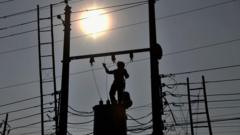Despite ongoing struggles with payment issues, officials are optimistic about working through the debt crisis, planning to process payments gradually while expressing concerns over the potential suspension of all supplies if the debt is not resolved by November 7. Energy consultant Fouzul Kabir Khan emphasized the Bangladesh government’s commitment to repay and not yield to perceived extortive practices. Power shortages, particularly in rural areas, have become increasingly common, exacerbated by a decrease in foreign currency reserves stemming from political upheaval that culminated in the ousting of the previous government.
The financial distress has prompted the interim government to seek an additional $3 billion loan from the International Monetary Fund (IMF), further complicating negotiations with foreign power suppliers including other Indian firms. To offset supply constraints, Bangladesh is also resuming operations at some gas and oil plants, even as this move raises costs during a challenging economic period. Meanwhile, the nation is looking to diversify its energy portfolio with the anticipated commissioning of its first nuclear power plant later this year, aimed at stabilizing energy supply amidst ongoing pressure in electricity generation.
The financial distress has prompted the interim government to seek an additional $3 billion loan from the International Monetary Fund (IMF), further complicating negotiations with foreign power suppliers including other Indian firms. To offset supply constraints, Bangladesh is also resuming operations at some gas and oil plants, even as this move raises costs during a challenging economic period. Meanwhile, the nation is looking to diversify its energy portfolio with the anticipated commissioning of its first nuclear power plant later this year, aimed at stabilizing energy supply amidst ongoing pressure in electricity generation.

















